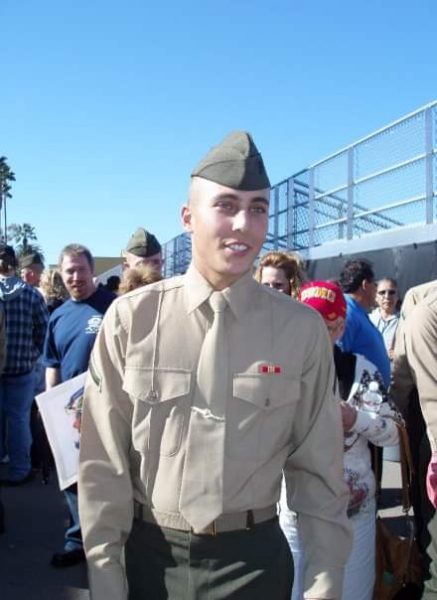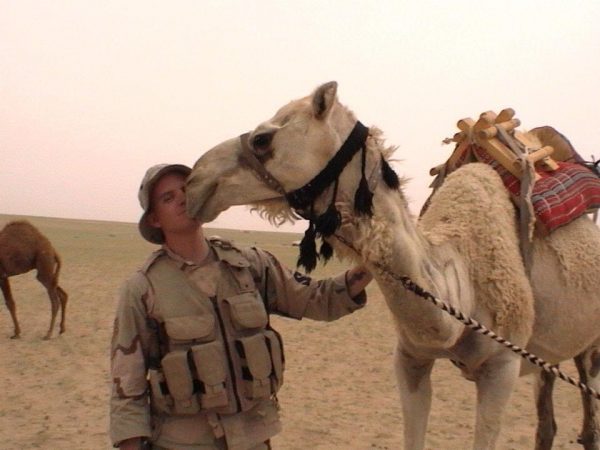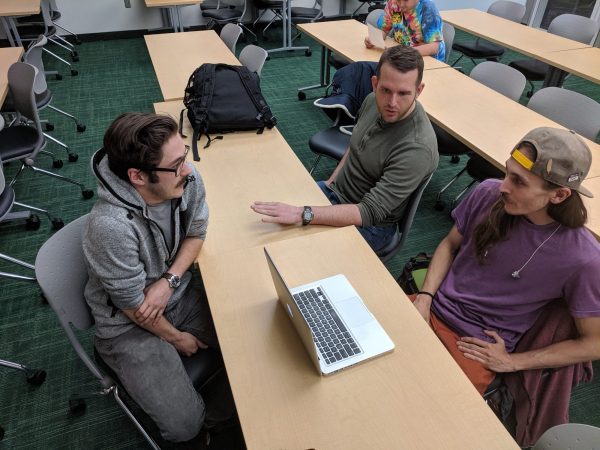“Philosophy has helped me to make sense of things and to be more mindful. It helps to avoid jumping on ideological bandwagons and to understand various arguments and their nuances,” explains Tim Milbrodt, rising senior philosophy major and US Air Force veteran.
Tim is one of about a dozen veterans who are now pursuing degrees in philosophy at CSU. Tim served for over fourteen years in the Air Force and completed numerous tours in the Middle East, including the United Arab Emirates, Kuwait, and Iraq. His classmates include Kyle Moncrieff, a military musician in the 2D Marine Division Band at Camp Lejeune, Max Clement, an electrical and mechanical systems maintenance worker for the Minuteman III Missile system in North Dakota, and Chandler Gordon, a cryptologic language technician also stationed in the US.

Besides their military service, they all share a passion for philosophy and a deepened appreciation of how it enhances thinking about the world and their own lives. Chandler explains, “I found philosophy helpful for dealing with the human condition, and becoming a more fully-realized self.” Kyle concurs, “Philosophy genuinely interested and challenged me. It required that I engage with the material deeply, rather than skimming the readings and regurgitating answers on a multiple-choice test. Philosophy taught me how to think.”
Tim was introduced to philosophy while in the military. As part of his training, he studied the works of Carl von Clausewitz, a 19th century Prussian general and theorist, the Chinese strategist and author of The Art of War, Sun Tzu, and the famed Roman emperor and Stoic philosopher Marcus Aurelius. Tim has since been drawn to social and political philosophy and is pursuing a minor in political science. Studying philosophy, though, is not without its challenges. Tim discusses the learning curve involved in excelling at philosophy, but is happy to “add more tools to the toolbox.” Tim, quoting Teddy Roosevelt, decided to pursue philosophy because “Nothing in this world is worth having or worth doing unless it means effort, pain, difficulty.”
Despite these challenges, all four students see the value of philosophy for processing their military experiences. Chandler finds the benefits of philosophy for post-service life “undeniable.” “I have a strong framework for understanding my service, which has helped dealing with some of the issues that tend to linger.” Max agrees that philosophy is helping him post-military. He explains, “There’s just a lot to being in an organization like that that I wanted to understand and I think philosophy felt like a place to begin that understanding.”

Kyle sees a large contrast with life inside and outside the military. “Any veteran can confirm that a major part of being in the military (at least in the early stages) is doing what you’re told to do, immediately, without question. Even when you feel like something is wrong, immoral, or unjust, you are expected to shut up and respect authority.” He values the role of philosophy in “teaching and encouraging us to question and challenge popular beliefs.” Kyle explains, “Now that I am out, I value the ability to question everything without immediately being criticized for doing so. Even beliefs we think are infallible should be questioned with vigorous scrutiny at some point in our lives.”
For Max, the call of philosophy is more spiritual. Though not religious, Max talks about the “God-shaped vacuum in the heart of each man”—a line attributed to Blaise Pascal—and how philosophy fills that hole in his life. Max explains, “For those years in the Air Force I had to suppress a lot of how I understood the world or I’d run into some pretty monumental contradictions about what the right thing for me to be doing was. It feels like philosophy is helping me understand myself and the world around me and put some meaning to my convictions as well as keep things that might be problematic in clear view.”

Now headed into their junior and senior years, the men reflect on what they will do next. Chandler is the most set in his plans: “After undergrad, I plan on attending law school. Philosophy has prepared me well. It teaches one how to adapt mentally, formulate ideas, and distinguish and categorize meaning. It also strengthens one’s reasoning and empathy, and teaches deep lessons in humility. I see these as categorical necessities for legal professionals.”
Kyle, on the other hand, is less sure: “I don’t have plans. Maybe live in my car and climb. Maybe work as a budtender. Generally speaking, philosophy has taught me how to think for myself and how to be an autonomous actor in society.”

Max plans to put his skills to work no matter where he ends up, “Philosophy helps you to quickly and concisely read and summarize content at high levels of understanding. I’m guessing I’ll do that in my next career path.”
Tim is looking to combine his interests in philosophy and political science during his next chapter. “Things are broken. We need new ways to do things, with new mentalities. Our Puritanical, capitalist, and atomistic systems and governments are not working. In fact, they’re ruining lives and the earth in the name of profit.” Tim is hoping to “change the system.” Armed with his philosophical training, passion for thinking and learning, and dedication to justice, he may just do so.
Read more about CSU’s recent student veterans, including philosophy major Joshua Griffin, in CSU Magazine.